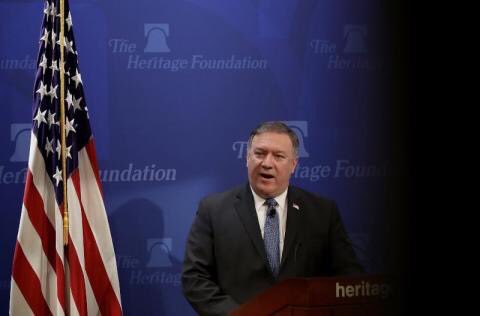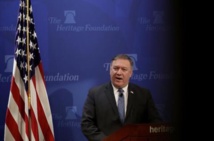"The US government has limited ability to provide emergency services to US citizens in Venezuela," according to the statement, which advised US citizens who are living or travelling in the South American country to "strongly consider departing."
Maduro on Wednesday announced that Caracas was breaking off diplomatic relations with Washington after US President Donald Trump's government recognized National Assembly speaker Juan Guaido as Venezuela's interim president.
Guaido announced that he was taking over the presidency during massive anti-government rallies on Wednesday.
Maduro subsequently gave US diplomatic staff 72 hours to leave the country. The deadline corresponds to Sunday, he said on Thursday, adding that Venezuelan diplomatic and consular staff would also leave the US on Saturday.
The State Department announcement was seen as reducing the chances of a stand-off. The United States had earlier said that Maduro did not have the authority to sever diplomatic relations because he was no longer president.
Secretary of State Mike Pompeo said earlier Thursday that the US had the right to continue its diplomatic mission in Caracas and "will continue to assert that right."
The US will "make the right decision" about its diplomats, how many will stay and for how long, he said in a radio talk show.
The government is focused on the security of the diplomats, who have an important mission, Pompeo said.
"The reason we want to be there is because we need a strong, democratic Venezuela where the humanitarian crisis, the disastrous conditions under which Maduro has let his people live for far too long, needs to be changed," he added.
Maduro meanwhile vowed to "continue governing" despite the "coup" which he said Guaido was attempting to stage with US support. However, he welcomed a proposal from Mexico and Uruguay to seek a dialogue between the government and the opposition.
"To talk, to listen to each other, to understand each other ... of course I agree," Maduro said at an event inaugurating the judicial year.
Guaido meanwhile continued acting as president, writing to Pompeo to request aid such as food and medicines for Venezuela.
He described the situation in the country, where annual inflation is running at nearly 2 million per cent and where many basic goods are lacking, as a "humanitarian emergency."
US Senator Marco Rubio published Guaido's letter on his Twitter account shortly after Pompeo said that Washington was willing to provide 20 million dollars in aid to Venezuela.
The death toll in the country's anti-government protests meanwhile rose to 26, the non-governmental human rights organization OVCS tweeted.
The protests started on Monday after the government announced it had foiled a small-scale mutiny within the National Guard.
Hundreds of thousands of people marched nationwide on Wednesday, and the protests continued overnight.
Maduro won a May presidential election widely criticized as undemocratic, and was sworn in for a second term on January 10 amid growing international pressure on him to resign.
"Peaceful protests" have been repressed by the army and paramilitary groups, according to OVCS. At least 320 people have been arrested since Monday, the daily El Nacional quoted the NGO Foro Penal as saying.
Defence Minister Vladimir Padrino reiterated that the army was loyal to Maduro, while warning that divisions among Venezuelans could escalate into "a civil war."
United Nations Secretary General Antonio Guterres called for a transparent and independent investigation of the reported casualties and urged all actors to lower tensions and avoid escalation, in a statement released by his spokesman.
Speaking at the Organization of American States in Washington, Pompeo urged Venezuela's security forces to protect Guaido and warned "remnants of the regime" against harming opposition protesters.
The US, the European Union, more than half a dozen Latin American nations and Albania have thrown their support behind the opposition. Russia, China, Iran, Turkey, Cuba, Bolivia and Nicaragua stood by Maduro as he held onto power.
In recent statements, Mexico said on Thursday that it would not break off relations with Maduro's "constituted government."
British Foreign Secretary Jeremy Hunt said London saw Guaido as "the right person to take Venezuela forward," while German Foreign Minister Heiko Maas said Berlin supports "what Guaido is doing."
Pope Francis, currently visiting Panama, was observing the tense political situation and supported "all efforts that help save the population from further suffering," a spokesman said.
Maduro on Wednesday announced that Caracas was breaking off diplomatic relations with Washington after US President Donald Trump's government recognized National Assembly speaker Juan Guaido as Venezuela's interim president.
Guaido announced that he was taking over the presidency during massive anti-government rallies on Wednesday.
Maduro subsequently gave US diplomatic staff 72 hours to leave the country. The deadline corresponds to Sunday, he said on Thursday, adding that Venezuelan diplomatic and consular staff would also leave the US on Saturday.
The State Department announcement was seen as reducing the chances of a stand-off. The United States had earlier said that Maduro did not have the authority to sever diplomatic relations because he was no longer president.
Secretary of State Mike Pompeo said earlier Thursday that the US had the right to continue its diplomatic mission in Caracas and "will continue to assert that right."
The US will "make the right decision" about its diplomats, how many will stay and for how long, he said in a radio talk show.
The government is focused on the security of the diplomats, who have an important mission, Pompeo said.
"The reason we want to be there is because we need a strong, democratic Venezuela where the humanitarian crisis, the disastrous conditions under which Maduro has let his people live for far too long, needs to be changed," he added.
Maduro meanwhile vowed to "continue governing" despite the "coup" which he said Guaido was attempting to stage with US support. However, he welcomed a proposal from Mexico and Uruguay to seek a dialogue between the government and the opposition.
"To talk, to listen to each other, to understand each other ... of course I agree," Maduro said at an event inaugurating the judicial year.
Guaido meanwhile continued acting as president, writing to Pompeo to request aid such as food and medicines for Venezuela.
He described the situation in the country, where annual inflation is running at nearly 2 million per cent and where many basic goods are lacking, as a "humanitarian emergency."
US Senator Marco Rubio published Guaido's letter on his Twitter account shortly after Pompeo said that Washington was willing to provide 20 million dollars in aid to Venezuela.
The death toll in the country's anti-government protests meanwhile rose to 26, the non-governmental human rights organization OVCS tweeted.
The protests started on Monday after the government announced it had foiled a small-scale mutiny within the National Guard.
Hundreds of thousands of people marched nationwide on Wednesday, and the protests continued overnight.
Maduro won a May presidential election widely criticized as undemocratic, and was sworn in for a second term on January 10 amid growing international pressure on him to resign.
"Peaceful protests" have been repressed by the army and paramilitary groups, according to OVCS. At least 320 people have been arrested since Monday, the daily El Nacional quoted the NGO Foro Penal as saying.
Defence Minister Vladimir Padrino reiterated that the army was loyal to Maduro, while warning that divisions among Venezuelans could escalate into "a civil war."
United Nations Secretary General Antonio Guterres called for a transparent and independent investigation of the reported casualties and urged all actors to lower tensions and avoid escalation, in a statement released by his spokesman.
Speaking at the Organization of American States in Washington, Pompeo urged Venezuela's security forces to protect Guaido and warned "remnants of the regime" against harming opposition protesters.
The US, the European Union, more than half a dozen Latin American nations and Albania have thrown their support behind the opposition. Russia, China, Iran, Turkey, Cuba, Bolivia and Nicaragua stood by Maduro as he held onto power.
In recent statements, Mexico said on Thursday that it would not break off relations with Maduro's "constituted government."
British Foreign Secretary Jeremy Hunt said London saw Guaido as "the right person to take Venezuela forward," while German Foreign Minister Heiko Maas said Berlin supports "what Guaido is doing."
Pope Francis, currently visiting Panama, was observing the tense political situation and supported "all efforts that help save the population from further suffering," a spokesman said.









 Home
Home Politics
Politics











